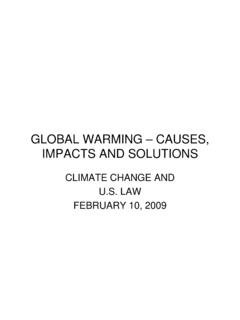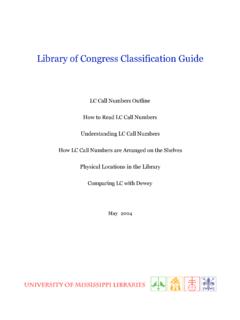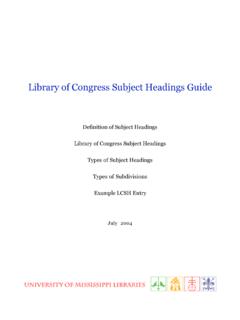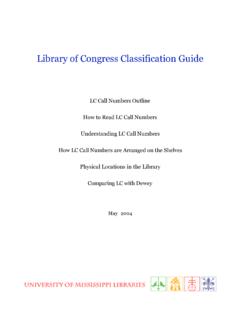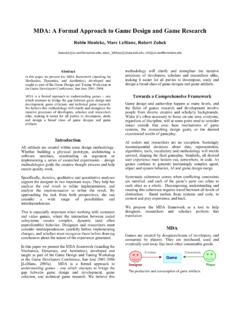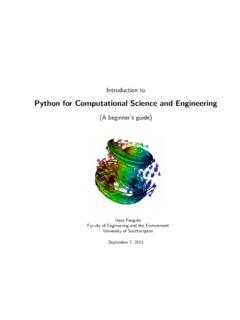Transcription of The Fine-Tuning Argument
1 2009 The AuthorJournal Compilation 2009 Blackwell Publishing LtdPhilosophy Compass 4/1 (2009): 271 286, Fine-Tuning ArgumentNeil A. Manson*The University of MississippiAbstractThe Fine-Tuning Argument (FTA) is a variant of the design Argument for theexistence of God. In this paper the evidence of Fine-Tuning is explained and theFine- tuning design Argument for God is presented. Then two objections arecovered. The first objection is that Fine-Tuning can be explained in terms ofthe existence of multiple universes (the multiverse ) plus the operation of theanthropic principle. The second objection is the normalizability problem theobjection that the Fine-Tuning Argument fails because Fine-Tuning is not Fine-Tuning Argument (FTA) is a recent variant of the design Argu-ment (also known as the Teleological Argument ) for the existence of Fine-Tuning Argument grew out of discoveries prompted by thedevelopment of Big Bang cosmology in the twentieth century.
2 Prior tothis development, it was thought by almost all scientists and philosophersthat the concept of the universe was too vague and amorphous to figureinto any respectable scientific discussion. Indeed, drawing on the argumentin Kant s First Antinomy, many claimed the term the universe could notdesignate any genuine object, because reason dictated that such an objectwould have to be both finite and infinite. After the development of BigBang cosmology, however, the universe was seen to be highly structured,with precisely defined parameters such as age ( billion years), mass,curvature, temperature, density, and rate of expansion. Modern physicsalso revealed that specific kinds of particles compose the universe andspecific kinds of forces govern these particles, and that the natures of theseparticles and forces determine large-scale processes such as cosmic expansionand star results of these scientific inquiries can be represented using a table,with the fundamental physical parameters of the universe listed on the leftand the actual values of those parameters on the right.
3 The list wouldinclude lines such as the The Fine-Tuning Argument 2009 The AuthorPhilosophy Compass 4/1 (2009): 271 286, Compilation 2009 Blackwell Publishing LtdLooking at the very precise numerical values of parameters such asthese, some physicists asked what the universe would have been like if thevalues had been slightly different. More specifically, for many an individualparameter, they asked what the universe would be like if that parameterwere varied while the remaining parameters were held fixed. The answer,to the surprise of many, was that the universe would not have been thesort of place in which life could emerge not just the very form of lifewe observe here on Earth, but any conceivable form of life. In many cases,the cosmic parameters were like the just-right settings on an old-styleradio dial: if the knob were turned just a bit, the clear signal would turnto static.
4 As a result, some physicists started describing the values of theparameters as fine -tuned for life. Let us henceforth use Fine-Tuning asshorthand for the fact that our universe is fit for life when modern physicsshows it so easily might not have give just one of many possible examples of Fine-Tuning , the cosmo-logical constant (symbolized by the Greek letter ) is a crucial term inEinstein s equations for the General Theory of Relativity. When ispositive, it acts as a repulsive force, causing space to expand. When isnegative, it acts as an attractive force, causing space to contract. If were notprecisely what it is, either space would expand at such an enormous ratethat all matter in the universe would fly apart, or the universe would collapseback in on itself immediately after the Big Bang. Either way, life could notpossibly emerge anywhere in the universe.
5 Some calculations put the oddsthat took just the right value at well below one chance in a trillion trilliontrillion trillion. Similar calculations have been made showing that the oddsof the universe s having carbon-producing stars (carbon is essential to life),or of not being millions of degrees hotter than it is, or of not being shotthrough with deadly radiation, are likewise astronomically small. Giventhis extremely improbable Fine-Tuning , say proponents of FTA, we shouldthink it much more likely that God exists than we did before we learnedabout Fine-Tuning . After all, if we believe in God, we will have an expla-nation of Fine-Tuning , whereas if we say the universe is fine -tuned bychance, we must believe something incredibly improbable idea can be formalized. FTA involves three propositions that arecommon to any version of the design Argument : (K) a statement of ourbackground scientific knowledge minus the alleged evidence of design ;(E) a statement of the alleged evidence of design ; and (D) the hypothesisthat there exists a supernatural designer.
6 In the case of FTA the propositionsare valueMp (mass of the proton) MeVMn (mass of the neutron) MeVc (the speed of light) 108 m1s 1G (the Newtonian gravitational constant) 10 11 m3kg 1s 2 2009 The AuthorPhilosophy Compass 4/1 (2009): 271 286, Compilation 2009 Blackwell Publishing LtdThe Fine-Tuning Argument 273K = Many of the initial conditions and free parameters of a universe need to be finely tuned in order for the development of life in that universe to be = The universe is indeed fine -tuned for = A supernatural designer of immense power and knowledge then consists of three premises and a conclusion. (1) The proba-bility of E, given K and assuming the denial of D, is extremely low; thatis, Fine-Tuning is exceptionally improbable if there is no designer if theuniverse is the way it is just by chance. (2) The probability of E, given Kand assuming D, is quite high; that is, Fine-Tuning is quite probable if asupernatural designer exists.
7 (3) The intrinsic probability of D theprobability of D just considered in light of K and not in light of E isgreater than the probability of E, given K and assuming the denial of D;that is, it is more probable that a supernatural designer exists than that,just by chance, the universe is fine -tuned. The conclusion derived is thatthe probability of D, given E and K, is quite high; that is, the existence ofa supernatural designer is quite high given that the universe is the form P(A |B) to stand for the probability of A conditionalon B (the probability of A given that B), FTA can be expressed formallyas Fine-Tuning Argument (FTA)(1) P(E|K & ~D) 0(2) P(E|K & D) >> 0(3) P(D|K) >> P(E|K & ~D) P(D|E & K) >> 0On this rendering, FTA is a Bayesian inference a well-established formof scientific reasoning involving conditional probabilities as both inputsand outputs.
8 Note that no specific numbers are mentioned in the inequalitiesabove. The numbers one gets depend upon whatever calculations ofthe evidence of Fine-Tuning one considers relevant, as well as on one sestimates of the intrinsic probability of D and of the probability of E givenK and is to be expected, there is considerable controversy surrounding thealleged cosmic coincidences underlying FTA. There are scientific dis-agreements about the calculations involved, as well as disagreements aboutjust what it takes for a universe to permit life. The fact that FTA concernsitself so intimately with these scientific details is what distinguishes FTAboth from a priori arguments for the existence of God ( , the OntologicalArgument) and a posteriori ones whose empirical premises are of anextremely general nature ( , the Cosmological Argument ). Due tolimitations of scope, the scientific details regarding FTA will not be274 The Fine-Tuning Argument 2009 The AuthorPhilosophy Compass 4/1 (2009): 271 286, Compilation 2009 Blackwell Publishing Ltdaddressed in this paper.
9 Also not addressed here are generic problemsconfronting any design Argument , whether that Argument be from cosmicfine- tuning for life, from the irreducible complexity that proponents of Intelligent design Theory say is rife in the biological realm, or fromsome other body of evidence. These generic objections tend to focus onpremises (2) and (3) of FTA. References both to scientific sources on FTAand to general considerations regarding the design Argument are providedin the For Further Reading section at the end of this article. The restof this paper is devoted to articulating two philosophical problems specificto Problem for FTA: The Multiverse HypothesisMany scientists and philosophers agree with the proponents of FTA thatfine- tuning is special and stands in need of explanation. For example,cosmologist Lee Smolin, who says that [t]he existence of stars is the keyto the problem of why the cosmos is hospitable to life (29), maintainsthat any philosophy according to which the existence of stars and galaxiesappears to be very unlikely, or rests on unexplained coincidence, cannotbe satisfactory (35).
10 Smolin does not think Fine-Tuning can be dismissedas the way things just happen to be. Yet he rejects FTA because he thinksfine- tuning can be explained in a purely natural way. More specifically, hethinks the fact that we observe a universe that is fine -tuned can beexplained in a perfectly natural way, if there exists a vast multitude ofuniverses. It is precisely such a multiple universe theory that he developsin his Life of the Cosmos. His is but one of several multiple-universetheories available nowadays. Though there is considerable scientific disputeabout the details of the various multiple-universe theories, many physicists(and many philosophers) support some such does such a theory explain Fine-Tuning ? Call the hypothesis thatthere exists a vast multitude of universes Multiple Universes (MU).According to MU there are very many (if not infinitely many) things likeour universe.
